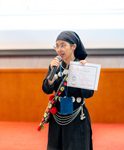 The Mekong Tourism Coordinating Office (MTCO), the ASEAN-Japan Centre (AJC), and the Lao PDR Ministry of Information, Culture, and Tourism jointly organised a four-day digital skills training workshop, 24-27 September in Luang Prabang, Lao PDR.
The Mekong Tourism Coordinating Office (MTCO), the ASEAN-Japan Centre (AJC), and the Lao PDR Ministry of Information, Culture, and Tourism jointly organised a four-day digital skills training workshop, 24-27 September in Luang Prabang, Lao PDR.
Twenty-eight participants from the public and private sectors attended the event entitled, “Enhancing Digital Skills for Women in Tourism Communities in Cambodia, Lao PDR, Myanmar, Thailand and Viet Nam – The Training of Trainers.”
The face-to-face workshop addressed key issues such as digital marketing analysis and planning, promoting community based tourism enterprises online, and developing digital skills training for community-based micro and small tourism businesses such as homestays, guest houses, restaurants, handicraft outlets and local tour services.
Participants also conducted field visits to community-based tourism enterprises, assessing their digital needs as real-life case studies.
The ‘training the trainers’ workshop also held sessions on effective resource utilisation, planning, budgets, and setting goals for digital marketing.
Naoko Fujikawa, Assistant Director, ASEAN-Japan Centre said that digital skills were crucial for marketing tourism products to the world. However, not many women in the tourism sector had opportunities to develop their digital marketing skills.
“By empowering these women with the knowledge to connect their local tourism products to the global market, we are not only supporting their personal growth but also nurturing the sustainable development of their communities,” said Fujikawa.
Phonemaly Inthaphome, Director General of Tourism Development, Lao PDR’s Ministry of Information, Culture and Tourism said: “Women have the potential to lead and innovate in tourism. By enhancing their digital skills, we are not just investing in individual capabilities, we are investing in the future of their communities.”
Suvimol ‘Dee’ Thanasarakij, Executive Director of the MTCO noted that women made up more than half of the tourism workforce in the Greater Mekong Sub-region. However, many were informal labourers with limited access to education and opportunities.
“Through this training, we aim to empower women in local tourism communities with the digital skills needed to strengthen their businesses and gain greater exposure to the global market,” she said.
Fujikawa added: “We believe these participants will become catalysts for change, passing on their knowledge and driving innovation in tourism across their regions.”
After the event, Thanasarakij concluded: “We hope this training will create a ripple effect, with participants passing on their knowledge and skills to others, fostering resilience and growth across the region.”





















